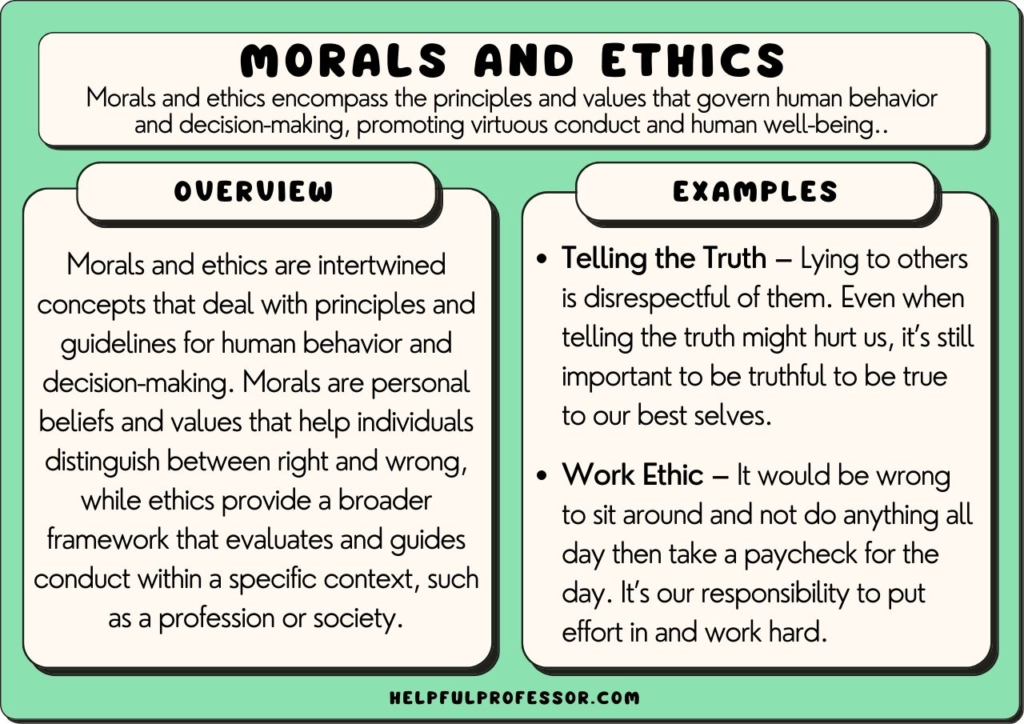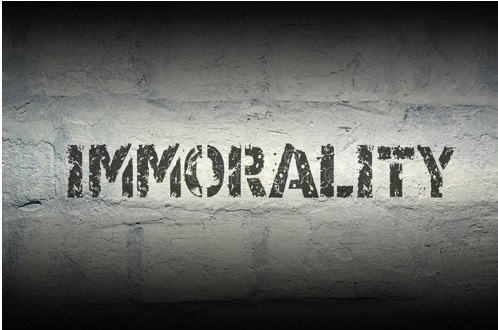A Closer Look at the Rise of Immorality in Contemporary Society
Immorality on the Rise – Sadly in today’s society, it has become increasingly evident that our values and moral standards are undergoing a significant shift. The once-celebrated virtues of goodness, empathy, and righteousness seem to be losing their place of prominence. Instead, there appears to be a disturbing trend where immorality is rewarded and celebrated, while acts of goodness and ethical behavior are often met with indifference or even punishment. Lets delve into the various factors contributing to this societal phenomenon. Exploring the influence of societal norms on moral standards and the impact of cultural changes on societal values, we aim to understand why contemporary society appears to prioritize and exalt immorality, while often disregarding and penalizing acts of good.

The influence of societal norms on moral standards
In today’s society, it often feels like moral standards are constantly evolving. What was once considered immoral or unacceptable may now be applauded or even celebrated. This shift in values is largely influenced by societal norms, which shape our understanding of right and wrong. As societal norms change over time, so do our moral standards, leading to a society that rewards and celebrates behaviors that were once considered immoral.
The impact of cultural changes on societal values
Cultural changes also play a significant role in shaping our societal values. As cultures blend and diversify, new perspectives and ideas are introduced, challenging traditional beliefs and moral frameworks. This can lead to a reevaluation of what is considered moral or immoral, as different cultures may have varying perspectives on ethical behavior. As a result, society adapts and evolves, often rewarding and celebrating behaviors that align with these changing cultural values.
The allure of immorality
Portrayal of immoral behavior in movies and television
One of the major influences on society’s shifting values is the media and popular culture. Movies and television shows often depict immoral behavior in an enticing and captivating manner, making it seem desirable and glamorous. Whether it’s the anti-hero who breaks the rules but still comes out on top or the villain who lives a life of luxury and power, these characters can be captivating and even admired. The depiction of unethical actions without adequate consequences or proper moral context could potentially desensitize individuals to such behavior, leading to its acceptance or normalization. Characters engaging in deceit, violence, or promiscuity are often glamorized, perpetuating a dangerous narrative that morality is subjective and personal gain supersedes ethical considerations. This not only distorts societal values but also undermines the cultivation of virtuous qualities necessary for a harmonious coexistence. Media has an undeniable impact on shaping cultural norms, and by showcasing immoral behavior without addressing its consequences or offering alternative perspectives, it inadvertently contributes to the rising immorality within our communities. As responsible consumers and creators of media content, it becomes imperative to promote narratives that prioritize moral reflection and scrutinize the implications these portrayals have on our collective moral compass while striving to foster empathy, integrity, and righteousness through thoughtful storytelling.
Glamorization of unethical actions in music and literature
Music and literature also play a significant role in shaping societal values. Unethical actions and behaviors are often glorified in popular songs and celebrated in books, further perpetuating the allure of immorality. In some cases, musicians and authors may even gain more attention and recognition for pushing the boundaries of what is considered morally acceptable. This can send a message to society that immorality is something to be celebrated rather than condemned.
The glamorization of unethical actions in music and literature has undeniably contributed to the rising immorality within society. Through the deliberate portrayal of immoral behaviors as cool or desirable, artists have subtly encouraged individuals to adopt such actions without considering their moral implications. Music, for example, often glorifies violence, substance abuse, and promiscuity, subsequently normalizing these behaviors among listeners. Similarly, literature that romanticizes criminals or morally corrupt characters can seduce readers into empathizing with their actions rather than condemning them. This trend has created a dangerous cultural shift where individuals are desensitized to unethical conduct and may even perceive it as an avenue for personal success or belonging. Consequently, society becomes more accepting and tolerant of immoral behaviors due to the continuous exposure to these representations within music and literature. It is imperative that artists take responsibility for the influence they wield and promote narratives that emphasize ethics and virtue rather than perpetuating a cycle of degeneracy.
Abnormal Morality: The normalization of unethical behavior
The role of social media in promoting immoral acts
With the rise of social media, the normalization of unethical behavior has become more prevalent. Social media platforms provide a stage for individuals to flaunt their immoral actions, often garnering attention and praise from their followers. This can create a culture where immorality is not only accepted but also expected. Likes, comments, and shares on posts that showcase unethical behavior reinforce the notion that such actions are worthy of celebration, perpetuating a cycle of reward for immorality. With millions of users participating on these platforms daily, it’s becoming increasingly common for individuals to use social media as a tool to spread hate speech, cyberbully others, engage in illegal activities or promote violence. The anonymity provided by online platforms often emboldens people to act immorally without fear of consequences or repercussions. Moreover, the viral nature of social media can amplify disturbing content quickly and widely, causing further harm and spreading immoral behavior like wildfire. To combat this growing concern, it is imperative that social media companies take more responsibility and implement stricter regulations to ensure that their platforms are not used as breeding grounds for immorality and encourage users to engage in positive dialogue instead.
The impact of technology on desensitizing society to immoral behavior
Technology, particularly through the accessibility of online platforms, has desensitized society to unethical behavior. Constant exposure to immoral actions, whether in the form of videos, images, or news stories, can desensitize individuals to the gravity of such behavior. Over time, this desensitization can erode the natural aversion and moral compass that would have otherwise deterred individuals from engaging in or rewarding immoral acts. As a result, society becomes more accepting of immorality, further fueling its celebration.
The consequences of celebrating immorality
Loss of trust in individuals and institutions
The celebration of immorality in society has profound consequences. It erodes trust in individuals and institutions, as the lines between right and wrong become blurred. When immoral behavior is rewarded, it can lead to skepticism and suspicion towards those who claim to uphold moral values. This loss of trust can weaken societal bonds and hinder the functioning of institutions that rely on trust to operate effectively.
Diminished empathy and compassion towards others
Furthermore, celebrating immorality can diminish empathy and compassion towards others. When society celebrates actions that harm or exploit others, it sends a message that empathy and compassion are not valued. This can lead to a disconnection among individuals, making it harder to build a supportive and caring community.
Fragmentation of social bonds and communities
Lastly, the celebration of immorality can result in the fragmentation of social bonds and communities. When society rewards and celebrates immoral behavior, it can create divisions among individuals with differing moral perspectives. This can lead to the formation of echo chambers and the exclusion of those who do not conform to societal norms. The resulting fragmentation can weaken the social fabric, making it more difficult to foster understanding, collaboration, and a sense of unity.
As society continues to evolve, it is essential to critically examine the values and moral standards we uphold. By promoting empathy, compassion, and ethical behavior, we can work towards a society that rewards and celebrates goodness, fostering trust, empathy, and social cohesion.
The paradox of punishing goodness
The tendency to view moral righteousness as self-righteousness
In today’s society, there seems to be a curious paradox: while we claim to value goodness and morality, we often exhibit discomfort when faced with individuals who embody these qualities. We start to view moral righteousness as self-righteousness, dismissing those who strive for goodness as preachy or holier-than-thou. This tendency reveals a deeper issue within our culture – a discomfort with confronting and acknowledging our own shortcomings.
When faced with individuals who hold high moral standards, it can provoke a sense of guilt and inadequacy. Rather than confronting these uncomfortable feelings, we often project our own insecurities onto those who are genuinely trying to do good. By labeling them as self-righteous, we try to diminish their moral standing, effectively excusing ourselves from the responsibility of introspection.
Social backlash against individuals exhibiting high moral standards
In addition to viewing moral righteousness as self-righteousness, our society often exhibits a social backlash against individuals who exhibit high moral standards. Instead of celebrating their efforts, these individuals often face ridicule, criticism, and sometimes even social isolation. This negative response can be attributed to a variety of reasons, ranging from jealousy and resentment to a collective cynicism that questions the authenticity of moral behavior.
When someone consistently demonstrates good moral values, it can inadvertently make others feel guilty or inadequate. Envy may arise when people compare their own actions to those of the morally upright individual. This envy then fuels the social backlash, leading to attempts to discredit or demean the person driven by moral standards. Unfortunately, this discourages others from aspiring to similar moral heights, creating a vicious cycle where immorality becomes more prevalent and celebrated.
The power dynamics of Immorality at play
Corrupt systems and institutions that reward immoral behavior
One reason why today’s society rewards and celebrates immorality is the presence of corrupt systems and institutions that incentivize unethical behavior. In many sectors, individuals who cut ethical corners are often rewarded with financial gain, power, or social status. This not only undermines the principles of fairness and justice, but also reinforces a culture that prioritizes personal gain over moral conduct.
Corporations that prioritize profit margins above ethical considerations, politicians who engage in dishonest practices to secure votes, and media outlets that sensationalize immoral behavior for ratings all contribute to the perpetuation of immorality. When these actions go unchecked and continue to be rewarded, it sends a message to society that immoral behavior is not only acceptable but also lucrative. This, in turn, erodes the moral fabric of our society.
Influence of economic and political factors on societal values
Economic and political factors also play a significant role in shaping societal values and the rewards system. In an increasingly materialistic and consumer-driven world, the pursuit of wealth and power often takes precedence over moral considerations. The relentless pursuit of economic growth and personal success creates an environment where immoral behavior is justified if it leads to financial or social success.
Likewise, political factors such as lobbying, corruption, and the influence of special interest groups can sway public opinion and determine which behaviors are celebrated or condemned. When those in power prioritize their own interests over the common good, it perpetuates a culture that rewards immorality and undermines the importance of ethical conduct.
Promoting and rewarding ethical behavior in today’s society
Raising awareness about the importance of ethical conduct
To counteract the current societal trend, it is crucial to raise awareness about the importance of ethical conduct. Education and public discourse should emphasize the long-term benefits and positive impact that moral behavior has on individuals and society as a whole. By highlighting the rewards and fulfillment that come from doing the right thing, we can shift the narrative and generate a collective desire for ethical conduct.
Encouraging ethical leadership and role models
Another way to foster a more virtuous society is by promoting ethical leadership and role models. When individuals in positions of power and influence demonstrate moral integrity, they become a source of inspiration for others. By showcasing leaders who prioritize ethical decision-making and display genuine compassion and empathy, we can create a ripple effect that encourages others to follow suit. Additionally, implementing measures that hold institutions accountable for their actions and incentivize ethical behavior can ensure that morality is upheld at all levels of society.
Nurturing a more virtuous society for the future
As we reflect on the current state of society, it is crucial to recognize the consequences of rewarding and celebrating immorality while punishing acts of goodness. The erosion of trust, empathy, and social cohesion threatens the fabric of our communities. However, by acknowledging the power dynamics at play, challenging societal norms, and promoting ethical behavior, we can begin to shape a more virtuous society. By recognizing and addressing society’s discomfort with moral righteousness, examining the corrupt systems that reward unethical behavior, and promoting awareness and ethical leadership, we can begin to nurture a more virtuous society for the future. It is only through collective efforts, fostering awareness, and cultivating ethical leadership that we can create a future where goodness is celebrated and rewarded, ultimately paving the way for a more harmonious and morally upright society.
Key Points and Questions
- Why does society seem to reward and celebrate immorality? Society’s shifting values and moral standards, influenced by media, popular culture, and technology, play a significant role in the reward and celebration of immorality. The allure of sensationalism and the desire for entertainment often overshadow ethical considerations.
- Are there consequences to celebrating immorality and punishing acts of goodness? Yes, there are consequences. The celebration of immorality can lead to the erosion of trust, empathy, and social cohesion within a society. Punishing acts of goodness can discourage individuals from exhibiting ethical behavior, contributing to a decline in moral standards and the fragmentation of communities.
- Why does society sometimes view moral righteousness as self-righteousness? Society’s discomfort with moral righteousness stems from various factors, including a tendency to perceive it as a form of arrogance or judgment. Some may find it challenging to distinguish between genuine moral conviction and a holier-than-thou attitude, leading to a negative perception of those exhibiting high moral standards.
- How can we shift the narrative and promote ethical behavior? Shifting the narrative requires raising awareness about the importance of ethical conduct and its long-term benefits. Encouraging ethical role models and leaders who exemplify moral values can inspire others. Additionally, challenging corrupt systems and institutions that perpetuate immorality is crucial in fostering a society that rewards and celebrates goodness.





